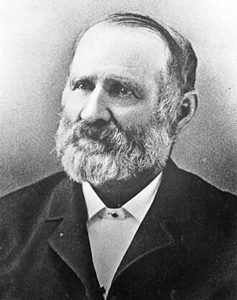The “Spud King” of Douglas and Denver Counties

Photo of Rufus “Potato” Clark. He used fertile Platte bottomlands as an avenue to riches, growing vegetables, especially potatoes, and merchandising them to the vast flow of miners needing provisions and new Denverites. Clark accumulated vast tracts of real estate, including sizable chunks of today’s Highlands Ranch. Dad Clark Drive in Highlands Ranch is named after him.
Swashbuckler! Now there’s a colorful term seldom used today.
One historical character that comes immediately to mind is D.C. Oakes of our Wildcat Mountains. Another bold, flamboyant and larger-than-life figure was Rufus “Potato” Clark, or sometimes called the “Spud King.” And sometimes he went by the moniker “Dad.”*
Rufus was born to a Connecticut farmer in 1822. A frenetic person from the start, he put out to sea at 15, sailing from the Indian Ocean to the Arctic Circle. In 1849, gold caught his interest, and he chased it in California, and later Australia, before coming up empty, disconsolately settling penniless in Taylor County, Iowa.
Then news from 1859 Colorado led him to sell his two hogs and head west again, this time part of an ox train and with his wife. By then an “old man” of 37, he had wised up and settled down, claiming acreage through the Homestead Act along the Platte River where Overland Golf Course is today.
With his farming background, Rufus used fertile Platte bottomlands as an avenue to riches, growing vegetables, especially potatoes, and merchandising them to the vast flow of miners needing provisions as well as new Denverites. Early bumper crops earned him $30,000. Using these prodigious profits, Rufus accumulated vast tracts of real estate, including sizable chunks of today’s Highlands Ranch. The Highlands Ranch Golf Club was another of his agricultural sweet spots with access to water where his famous potatoes flourished nicely. Dad Clark Drive in Highlands Ranch is named after him.
Rufus’ successes brought him great wealth, but also allowed for some bad habits, among them an unquenchable appetite for alcohol. One time, in deep a depression, it is said he even flirted with suicide. Fate and faith intervened in 1873 when under the influence of an evangelist named Hammond, Rufus converted to Christianity at a Denver tent revival run by the Church of the United Brethren in Christ. He was quoted as saying, “I am announcing to the world – I have got religion! I have reformed, thank God before it is too late. I am renouncing the devil and all his works.”
Acknowledging the role that the church had played in his life, Rufus turned to philanthropy. After being approached by the Methodist Church in 1884 to support the University of Denver’s relocation from the city, he donated 80 acres of his holdings, selling another tract of 320 for a generous price. The only proviso on the deal was that sale and manufacture of alcohol was prohibited on the parcels.
Rufus’ biggest transaction was his sale of 15,000 acres, the bulk of today’s Denver Tech Center, to the Clark Colony, an agricultural settlement that he favored. The venture, which needed water on which it could rely, later underwrote and built the Castlewood Canyon Dam.
For all his wealth, Rufus lived quite simply, dabbling in low-level politics including a stint in the territorial legislature in 1865. He had a habit of calling people by the state of their birth rather than their given name.
When Rufus died, he made minor bequests to friends and family, even $3,500 to the U.S. government, as he had known a man who defrauded it by that much and Rufus paid it back on his behalf. Ironically, though he had failed abysmally as a miner, Rufus still made his fortune digging in the dirt – though he struck it rich with potatoes, not gold.
*Checking four different sources, it is unclear how Rufus got the nickname “Dad.” The presumption is, having personally morphed from penniless to astronomically wealthy, all viewed him as a “dad.”
By Joe Gschwendtner; courtesy photo